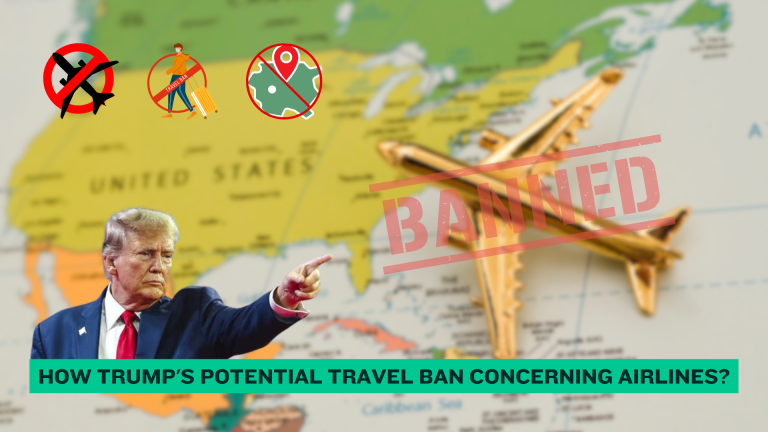In 2025, former U.S. President Donald Trump introduced a proposal for a new travel ban that could restrict entry into the United States for citizens from up to 43 countries. This proposal for a ban is part of his broader immigration and national security agenda, which is mainly focused on tightening border control and limiting visa access for countries that allegedly do not meet U.S. security standards. However, this news has worried many people worldwide. Specially, travelers, airlines, students, businesses, and human rights groups. Moreover, many people think this ban could disrupt global travel, reduce tourism, and harm diplomatic relations.
Which Countries Are In The List Of The New Travel Ban?
The administration is considering implementing travel restrictions on citizens from 43 countries. Well, the US has categorized those countries into three groups based on perceived security risks. Though specific countries under consideration have not been officially disclosed, but many reports suggest that countries from various regions, including the Middle East, Africa, and Asia, are under consideration.
| List Category | Visa Status | Countries Included |
| Red List | Full suspension of visas (immigrant & non-immigrant) | Afghanistan, Bhutan, Cuba, Iran, Libya, North Korea, Somalia, Sudan, Syria, Venezuela, Yemen |
| Orange List | Partial visa suspensions (e.g., work, student visas) | Belarus, Eritrea, Haiti, Laos, Myanmar, Pakistan, Russia, Sierra Leone, South Sudan, Turkmenistan |
| Yellow List | 60 days to improve security, or face further restrictions | Angola, Antigua and Barbuda, Benin, Burkina Faso, Cambodia, Cameroon, Cape Verde, Chad, Democratic Republic of the Congo, Dominica, Equatorial Guinea, Gambia, Liberia, Malawi, Mali, Mauritania, Republic of Congo, Saint Kitts and Nevis, Saint Lucia, São Tomé and Príncipe, Vanuatu, Zimbabwe |
How This Travel Ban Impacts Airlines
The proposed 2025 travel ban by President Donald Trump has significantly impacted the airline industry. This step not only impacts international travel demand but also affecting local tourism, financial performance, and operational strategies. Still want to learn more here’s an in-depth analysis of how airlines are being affected:
Decline In International Bookings
The anticipation of the travel ban has made9 a noticeable decrease in international flight bookings to the United States.
- European Market: A data indicates that 12.8% decline in bookings for summer flights to the U.S. from Europe, in those list cities like Amsterdam, Munich, and Heathrow experiencing drops of 23.2%, 20.3%, and 14.7% respectively.
- Australian Visitors: In March 2025 saw a 7% decrease in Australian visitors to the U.S. Can you belive it? Not only that this is marked as the most significant drop since the COVID-19 pandemic.
- UK Tourism: Nothing goes beyond UK tourism. There was a 14.3% reduction in UK tourists visiting the U.S. in March 2025 compared to the previous year.
These declines are attributed to concerns over the proposed travel ban, stricter border controls, and the overall perception of the U.S. being less welcoming to foreign visitors.
Financial Impact On Airlines
The decrease in international travel demand has directly impacted financially to airlines:
- Revenue Forecasts: Major U.S. airlines like Delta Air Lines, Frontier Group have published their financial forecasts for 2025, citing weakened travel demand due to the proposed travel ban and associated tariffs.
- Stock Performance: Airline stocks have experienced volatility, with significant drops following the announcement of new tariffs and the proposed travel restrictions.
These financial uncertainties have led airlines to reassess their growth strategies and operational plans for the year.
Operational Adjustments
In response to the changing travel destinations, airlines are also making operational changes:
- Capacity Reduction: Airlines have scaled back their capacity expansion plans and adjusted flight schedules to align with the decreased demand.
- Route Reevaluation: Some airlines are reevaluating their international routes, considering reductions or suspensions of flights to regions most affected by the proposed travel ban.
These adjustments are aim to mitigate financial losses and optimize operations amid the solve travel environment.
You can try Alternative Destinations in Phuket
- Alternative Destinations: Travelers right now are choosing those destinations who are more welcoming. For instance, bookings to East Asia and Northern Europe have increased, while U.S. bookings have declined.
- Domestic Travel: Some travelers are choosing domestic vacations over international trips to the U.S., which is impacting the global travel dynamics.
You can also check other destination spot by clicking Destination Spotlight
These shifts affect not only airlines but also the broader tourism industry reliant on international visitors.
Broader Economic Implications
Well, This travel ban not only impact on airlines, but it also impacts other areas as well.
- Tourism Revenue: The decline in international visitors affects tourism revenue, with potential losses amounting to billions of dollars.
- Hospitality Sector: Hotels, restaurants, and other businesses dependent on international tourists face decreased patronage, leading to economic challenges in tourist-centric regions.
Why Donald Trump Proposed Travel Ban?
President Donald Trump has introduced this new travel ban for 2025. This deciesion has been taken based on worries about national security, changes to immigration rules, and political reasons. Here’s a simple explanation of why this travel ban is being proposed:
National Security Concerns
The primary justification for the proposed travel ban is to strong national security. The Trump administration argues that certain countries have inadequate security screening processes, which could allow individuals with malicious intent to enter the United States. An executive order issued in January 2025 emphasized the need to protect U.S. citizens from potential threats posed by foreign nationals who might commit terrorist acts or exploit immigration laws for harmful purposes .
However, the administration has mandated social media vetting for visa applicants who have visited regions like the Gaza Strip, citing concerns over potential security risks.
Immigration Policy Objectives
Beyond immediate security concerns, the proposed travel ban aligns with the administration’s broader immigration policy goals. By imposing stricter entry requirements, the administration aims to control the flow of immigrants and ensure that those entering the U.S. do not pose security risks. This approach reflects a desire to prioritize national interests and safety in immigration decisions.
Political Considerations
The travel ban also serves political objectives. It reinforces the administration’s commitment to strong border security and immigration control, key themes in Trump’s political platform. By taking a firm stance on these issues, the administration seeks to appeal to constituents who prioritize national security and strict immigration policies.
Response To Global Events
Global events and conflicts have also influenced the proposed travel ban. For instance, increased tensions in certain regions and concerns over international terrorism have prompted the administration to reassess visa policies. By implementing stricter controls, the administration aims to mitigate potential risks associated with global instability.
FAQ
What Is The Purpose Of The Proposed Travel Ban?
The administration aims to organise national security by restricting entry from countries deemed to have inadequate security screening processes.
How Will The Travel Ban Affect International Students?
International students from affected countries may face visa revocations, increased scrutiny, and potential deportations, impacting their education and residency in the U.S.
Are There Any Legal Avenues To Challenge The Travel Ban?
Yes, legal challenges have been initiated, including lawsuits against the revocation of student visas and passport policy changes, citing constitutional violations.
How Can Travelers Stay Informed About The Travel Ban’s Status?
Travelers should regularly check official government websites, consult with immigration attorneys, and stay updated through reputable news sources.
What Steps Can Employers Take To Mitigate The Impact Of The Travel Ban?
Employers should review their hiring practices, consult with legal experts, and develop contingency plans to address potential workforce disruptions.
Conclusion
In conclusion, while the proposed travel ban is currently delayed, its potential implementation could have significant effects on international travel, the airline industry, and global mobility. Stakeholders are advised to stay informed and prepared for possible changes.






